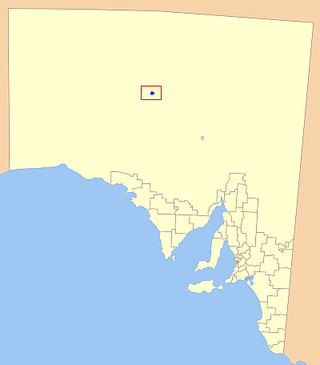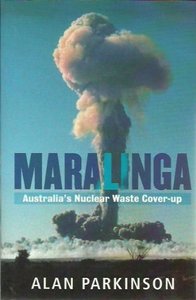Related Research Articles

Coober Pedy is a town in northern South Australia, 846 km (526 mi) north of Adelaide on the Stuart Highway. The town is sometimes referred to as the "opal capital of the world" because of the quantity of precious opals that are mined there. A blower truck is raised above the town sign, representing the importance of opal mining to the town's history. Coober Pedy is also renowned for its below-ground dwellings, called "dugouts", which are built in this fashion due to the scorching daytime heat.

The Goldman Environmental Prize is a prize awarded annually to grassroots environmental activists, one from each of the world's six geographic regions: Africa, Asia, Europe, Islands and Island Nations, North America, and South and Central America. The award is given by the Goldman Environmental Foundation headquartered in San Francisco, California. It is also called the Green Nobel.

Lowitja O'Donoghue, also known as Lois O'Donoghue and Lois Smart, was an Australian public administrator and Indigenous rights advocate. She was the inaugural chairperson of the Aboriginal and Torres Strait Islander Commission (ATSIC) from 1990 to 1996. She is known for her work in improving the health and welfare of Indigenous Australians, and also for the part she played in the drafting of the Native Title Act 1993, which established native title in Australia.

The Pitjantjatjara are an Aboriginal people of the Central Australian desert near Uluru. They are closely related to the Yankunytjatjara and Ngaanyatjarra and their languages are, to a large extent, mutually intelligible.

The District Council of Coober Pedy is a local government area located around the opal mining town of the same name in Outback South Australia. The district's economy is based on the large opal deposits found beneath it, which have made it a major mining centre and also a popular tourist destination.
The Peter Rawlinson Award is an annual Australian environment award by the Australian Conservation Foundation consisting of $3000 and a plaque made to individuals who have made an outstanding voluntary contribution to the Australian environment. It commemorates Dr Peter Rawlinson's contribution as an environmental campaigner and researcher. Rawlinson was an ACF Treasurer and Vice President and a biologist and conservationist who died while doing field work in Indonesia in 1991.

Nuclear weapons testing, uranium mining and export, and nuclear power have often been the subject of public debate in Australia, and the anti-nuclear movement in Australia has a long history. Its origins date back to the 1972–1973 debate over French nuclear testing in the Pacific and the 1976–1977 debate about uranium mining in Australia.
Eileen Kampakuta Brown is an Aboriginal elder from Australia. She was awarded the Goldman Environmental Prize in 2003 together with Eileen Wani Wingfield, for their efforts to stop governmental plans for a nuclear waste dump in South Australia's desert land, and for protection of their land and culture.
The Kupa Piti Kungka Tjuta is a council of senior Aboriginal women from Coober Pedy, South Australia. They protest against Government plans to dump radioactive waste in their land, and for the protection of their land and culture.
Yvonne Margarula is an Aboriginal Australian environmentalist who won the 1998 Friends of the Earth International Environment Award and the 1998 Nuclear-Free Future Award. She also won the 1999 US Goldman Environmental Prize, with Jacqui Katona, in recognition of efforts to protect their country and culture against uranium mining.

Maralinga: Australia's Nuclear Waste Cover-up is a book by Alan Parkinson about the clean-up of the British atomic bomb test site at Maralinga in South Australia, published in 2007.

The prospect of nuclear power in Australia has been a topic of public debate since the 1950s. Australia has one nuclear plant in Lucas Heights, Sydney, but it is not used to produce nuclear power. It is used to produce medical radioisotopes.It also produces material or carries out analyses for the mining industry, for forensic purposes and for research. Australia hosts 33% of the world's uranium deposits and is the world's third largest producer of uranium after Kazakhstan and Canada.
The Conservation Council of South Australia, also known as Conservation SA and Conservation Council SA, is an environmental organisation serving as a peak body, representing over 50 member groups, representing over 90,000 individual members, in the state of South Australia.
Muckaty Station, also known as Warlmanpa, is a 2,380-square-kilometre (920 sq mi) Aboriginal freehold landholding in Australia's Northern Territory, 110 kilometres (68 mi) north of Tennant Creek, and approximately 800 kilometres (500 mi) south of Darwin. Originally under traditional Indigenous Australian ownership, the area became a pastoral lease in the late 19th century and for many years operated as a cattle station. It is traversed by the Stuart Highway, built in the 1940s along the route of the service track for the Australian Overland Telegraph Line. It is also crossed by the Amadeus Gas Pipeline built in the mid-1980s, and the Adelaide–Darwin railway, completed in early 2004. Muckaty Station was returned to its Indigenous custodians in 1999.
Alex Kelly is an Australian freelance artist, filmmaker and producer based in regional Australia. Kelly was born in regional NSW and grew up in a farming community near Wodonga in regional Victoria,
Tjayanka Woods is an Australian Aboriginal artist. She was one of the pioneers of the art movement across the Ngaanyatjarra, Pitjantjatjara and Yankunytjatjara lands, which began in 2000. She is best known for her paintings, but also a craftswoman who makes baskets and other woven artworks. Her paintings are held in the Art Gallery of Western Australia, National Gallery of Victoria, and the National Gallery of Australia.
Wingu Tingima was an Aboriginal artist from central Australia. She was born in Great Victoria Desert, and grew up living a traditional way of life in the bush, without any contact with Western civilization. A member of the Pitjantjatjara people, she painted spiritual stories from her Dreaming. Along with her friend and colleague Eileen Yaritja Stevens, Wingu became one of the most well-known artists to paint in the style of the Western Desert.
The nuclear industry in South Australia is focused on uranium mining, milling and the export of uranium oxide concentrate for use in the production of nuclear fuel for nuclear power plants. The state is home to the world's largest known single deposit of uranium, which is worked by BHP at the Olympic Dam mine.

Tony Tjamiwa, also known as Tony Curtis, was a highly respected elder, traditional healer and storyteller of the Pitjantjatjara people. He was a native speaker of the Pitjantjatjara language.
References
- ↑ Goldman Environmental Prize: Eileen Wani Wingfield Archived 4 December 2007 at the Wayback Machine (Retrieved 2 December 2007)
- 1 2 Kristine Moruzi; Michelle J Smith; Elizabeth Bullen, eds. (2018). Affect, emotion, and children's literature representation and socialisation in texts for children and young adults. ISBN 9781138244672. OCLC 1015755274.
- ↑ Australia's Nuclear Waste Still in Limbo, Environment News Service, 12 August 2004, retrieved 4 September 2009
- ↑ Environmental Awards Celebrate Grassroots Action, Environment News Service, 14 April 2003, retrieved 4 September 2009
- ↑ Eileen Wani Wingfield and Eileen Kampakuta Brown (1930s-), 8 March 2005, retrieved 4 September 2009
- ↑ Edna Tantjingu Williams (2000). Down the hole, up the tree, across the sandhills-- : -- running from the state and Daisy Bates. Jukurrpa Books. ISBN 1864650249. OCLC 49345730.
